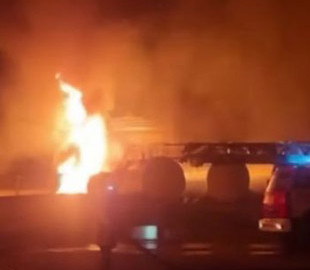
The Ministry of Energy of Russia will no longer provide Rosstat with information on the volume of production of gasoline and diesel fuel. The department explained this decision with considerations of energy security. According to the latest Rosstat data published on May 23, gasoline production in Russia has dropped to a minimum after drones struck at least five large oil refineries (refineries) in the Russian Federation in three weeks.
On the night of May 27, drones hit two gas stations in the city of Livna, Oryol region. Car gas stations (gas stations) are located 250 m from each other in the immediate vicinity of the Livna oil depot. Due to regular drone attacks on Russian refineries, in May 2024, according to Reuters, 12% of Russia's oil refining capacity was idle. As early as the end of April 2024, Western media wrote that a wave of drone attacks on oil refineries in the depths of Russia led to the fact that the Russian Federation is running out of gasoline.
“Diesel fuel prices for Russian consumers have skyrocketed… Gasoline prices also hit a six-month high and are up more than 20% since the start of the year as supply shrinks and more companies are forced to shut down production,”, — from a Politico publication.
Fuel production in Russia has been declining for several weeks in a row. And the government cannot ensure the safety of oil refineries.
“From May 13 to 19, according to official statistics, Russian refineries produced 740,000 tons of gasoline — 2.5% less than a week earlier, 5% less than at the beginning of May, and 20% less than the levels at the end of December (then refineries produced more than 930 thousand tons of gasoline every week)”, — from the publication of The Moscow Times.
To compensate for the losses and avoid a shortage, the Ministry of Energy allowed oil refineries to reduce the quality requirements for gasoline, Reuters writes with reference to sources. Thus, manufacturers were allowed to increase the share of aromatic compounds in gasoline by 7%, and the share of ethyl alcohol — at 5. And in order to hide the catastrophic collapse of production, the Russian authorities closed data on the volume of fuel output. The Ministry of Energy of Russia said — this is because the information can be used by unscrupulous market participants for manipulation.
“ As reported by “ Important stories” a source familiar with the state of affairs in Rosstat, the weekly data on the production of petroleum products are classified at the initiative of the Ministry of Energy. To the correspondent's clarifying question about whether this applies to the data only this week, or whether it will continue to be the case, the interlocutor answered: “This minced meat does not roll back”, — from the publication of the edition “Vazhnye istorii”.
The matter is not unscrupulous market participants, experts say. Moscow wants to hide data on fuel production so that it can manipulate the numbers to its advantage.
< p>“They want to hide the effectiveness of the Ukrainian Armed Forces, which are successfully destroying facilities for processing and saving oil refining products — this is the main reason. The second reason — economic If you know how much gasoline the enemy has, you can even calculate some long-term strategic operations — both military and economic”, — explained professor, rector of the International Institute of Business, banker and economist Oleksandr Savchenko.
Ukraine has invested considerable funds in the development and production of long-range drones. Some successfully overcome more than a thousand kilometers. And this means that approximately half of the oil refining enterprises in the Russian Federation are under threat. Anti-aircraft defense (ADF) is unable to protect them, the Kremlin admitted. That is why company management is massively buying stationary and mobile systems to protect against drones. And the largest Russian oil company “Rosneft” appealed to the authorities to compensate the costs of protecting the refinery from drone attacks.

